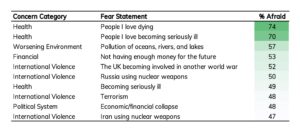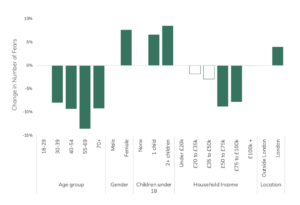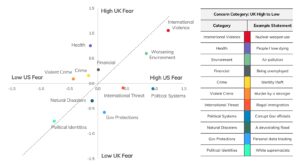The G20’s Agenda: What Really Worries Their Electorate
Posted: 18/11/2024


This year’s G20 summit is in Brazil, with many newly elected leaders joining the conference for the first time – this year the UK, America, France and Japan all held elections. But what do their electorates really care about? What concerns do voters have and what can their leaders do to address them? We asked a representative sample of over 2,000 UK adults about 97 different fears across a range of topics including the environment, the political system, war, crime and many more.
Top Electorate Fears
The 97 fears were grouped into 10 categories. Figure 1 shows the top 10 and their categorisation. The first two are about the people we love and the healthcare system that protects them – with 74% and 70% of us fearing someone dying or becoming seriously ill. Interestingly only half of the population are scared of becoming seriously ill themselves. By implication, the NHS, and global healthcare more generally, will continue to dominate voter concerns.
Figure 1: Top 10 UK Fears

Source: Dectech Research May 2024, n = 2,115
Another prominent category in this list is the fear of international violence. Around half of the respondents indicated they are afraid of the UK becoming involved in another world war (52%), Russia using nuclear weapons (50%), terrorism generally (48%) and Iran developing nuclear weapons (46%). The uncertainty of the current times is certainly reflected. Finally, the recent inflation and economic turbulence that overshadowed the US Presidential election earlier in November also appears. 53% of voters are scared of not having enough money and 48% fear economic collapse.
Who is Afraid?
As part of the work, we also looked at how these fears vary by demographics. The average person is worried about 32 out of the 97 fears. But 25% were afraid of less than 9 and 25% were afraid of more than 49. That’s a huge range in fear levels. Figure 2 shows how the average changes for different kinds of people. For example, older people have about 10% fewer fears than young people. The exception was international threats where we found more fear in older cohorts, reflecting their prior experience.
Figure 2: Who is Most Afraid?

Source: Dectech Research May 2024, n = 2,115. Difference between demographics in % of fear statements a respondent is afraid or very afraid of.
Meanwhile, households with children report significantly higher fear levels. This echoes the earlier healthcare finding that we are more worried about loved ones than ourselves. Clearly children are more vulnerable. Vulnerability may also play a part in the observed gender differences. Fear levels are higher in women, especially when it comes to general crime and violent crime.
Finally, London’s population is significantly more fearful than those living elsewhere in the UK. This is especially true when it comes to violent crime and concerns about financial issues, reflecting London’s higher crime rates and higher cost of living.
International Comparison
Whilst we ran our fieldwork in the UK, the 97 fear statements were originally developed for another study that’s been conducted every year in the United States1 since 2014. So, even though we didn’t capture voter concerns across all 20 countries in the G20, this does allow us to see how correlated fears are across two major economies.
Figure 3: American and British Fears

Source: Dectech Research May 2024, n = 2,115
Figure 3 shows this international relationship. As you can see the two nations are reasonably correlated, suggesting a fair amount of international agreement on how concerning an issue is. In the upper right corner, we can see that both UK and American voters are very concerned about international violence and war. In particular, the scariest statement within this category was the threat of a world war. The populations of both countries are also worried about the worsening environment. The biggest specific environmental fear is pollution of the oceans, rivers & lakes.
Conversely, both countries are less concerned about political groups. It’s worth noting that both the UK and US have recently experienced far-right riots. Yet, the 6th January Capitol attack in America didn’t seem to play an important role in their recent election. It appears that the electorate don’t regard these factions, like the Proud Boys and Oath Keepers, as a systemic threat.
But the two countries aren’t aligned on everything. Notably, the US population is far more concerned about their political system and the protection of their privacy from the government. Indeed, the number one US fear is of corrupt Government officials. On the other hand, the UK population is more anxious about healthcare than their American counterparts, reflecting the materially better US per capita expenditure and outcomes2.
Conclusions
Overall, the fear of international conflict and a potential world war should dominate the G20. This is what’s worrying the electorate. Less pressing, but also worrying are environmental problems. On the agenda for the main summit debates are a discussion on how to modernize the main international institutions, such as the United Nations, and how to manage the world’s energy transitions to address the climate crisis. While these issues clearly align with many of the concerns we have identified, it remains to be seen whether this conference will provide the reassurance and direction that people want.
-
S. Andrus, ” The Top 10 Fears in America 2023″, Chapman University Blog, October 2023, Available: https://blogs.chapman.edu/wilkinson/2023/10/20/the-top-10-fears-in-american-2023/.
-
Office for National Statistics, “How does UK healthcare spending compare with other countries?”, ONS.gov.uk, August 2019. Available: https://www.ons.gov.uk/peoplepopulationandcommunity/healthandsocialcare/healthcaresystem/articles/howdoesukhealthcarespendingcomparewithothercountries/2019-08-29#:~:text=In%20the%20OECD%2C%20spending%20was,per%20person%20in%20the%20UK